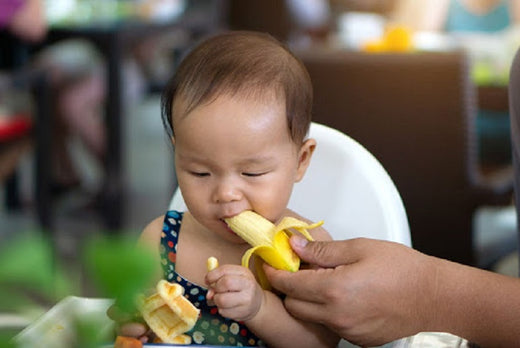
Baby food allergies happen when your child's immune system reacts to food that he/she has consumed. Histamine and other substances are released in the body’s tissues and this leads to a symptom of allergic reaction that can be observed in your child. Even small amounts of that allergen can cause a reaction when it has entered the child's body1. Reactions to food allergies can cause different complications that may be serious. To prevent or quickly respond to these reactions, it’s important to be aware of your baby’s food allergies and common allergy-causing food2.
How Do I Prevent Baby Food Allergies?
In understanding baby food allergies, it’s important to introduce common food allergens within your child’s first 12 months of age3. Studies show that children who were introduced late with these common allergy-causing foods have a higher chance of developing food allergies3. This method also includes babies with a history of food allergies in the family or if they have been diagnosed with another food allergy3.
In introducing these foods, only include one common food allergen to your child’s meal at a time to easily determine the cause of your child’s allergy3. If your child experiences an allergic reaction, immediately stop giving this to your child and reach out to your family doctor for further medical advice3.
If your child did not exhibit an allergic reaction to these, continue giving them to your child at least twice a week3. Not doing so may cause baby food allergies to develop if they haven’t consumed this food in a while3,4.
There are no studies that specify the amount of food allergens to consume, so it would be safe to take in small amounts at first, and then gradually increase servings as they grow up. The advisable amount to take at first is at least a teaspoon4.
What Do I Feed My Child?
Baby food allergies are commonly caused by these allergens about 90% of the time2:
- Cow’s milk
- Peanuts
- Eggs
- Soy
- Wheat
- Tree nuts (walnuts, cashews, etc.)
- Seafood
When feeding your child solid food, make sure to give them the appropriate food texture for their age. Avoid feeding your child whole nuts if they’re still in their early stages. This is to prevent your baby from choking3. Once you have confirmed your baby’s food allergy with one of these common allergens, you can consider some of these substitutes5:
Replacing Egg
You can start considering using mashed bananas instead of eggs in baked goods. Try your hand at making your pancakes with nutritious mashed bananas.
For mayo or other egg-based products, there are various egg-free versions of these staples. Try egg-free mayo for a start.
Replacing Wheat
Wheat is also an allergen you have to watch out for. But your child doesn’t have to miss out on meals with wheat just because they have baby food allergies. You can start trying out wheat-free or gluten-free products in the market. Baking or creating your own meals wheat-free may not be easy at first but don’t hesitate to look for recipes that contain alternatives such as oats.
These are just examples of how to avoid or replace some common ingredients that are also allergens.
Baby Food Allergies Tip: How Do I know If My Child is Experiencing a Reaction?
For common baby food allergies, there are common symptoms you can watch out for. Here are some examples2,6:
Skin Problems
Here are some symptoms that can be observed on your child’s skin when they experience common baby food allergies:
- Problems in breathing
- Appearance of hives
- Itchy rashes
- Swelling
- Sneezing
- Tightness in the throat
- Red spots
Stomach Problems
Symptoms can also be observed with stomach problems:
- Pale skin
- Nausea
- Vomiting
- Diarrhea
- Problems with circulation
- Feeling light-headed
- Belly pain
- Loss of consciousness
Once you have observed these symptoms, don’t hesitate to contact your family doctor and make sure to take note of the common allergy-causing food you have fed your child. These baby food allergies may be diagnosed by your doctor based on your keen observation.
If you have observed these symptoms and your child was diagnosed with a food allergy, it’s important to remember that baby food allergies can be outgrown8. Make sure to follow your doctor’s advice to ensure a safer meal plan and proper care for your baby food allergies.
If you have a known family history of food allergies, there is an increased risk that your child may have it too. Which is why food allergies are often considered hereditary7. However, if one of your children is diagnosed, your other children may also have a higher risk of developing food allergies8. With this in mind, make sure to be more observant with possible allergic reactions in their meals because this is essential to knowing if your baby has a food allergy.
As you and your child explore different food for nutritional benefits, a more observant approach is necessary to ensure your child’s safety and growth.
Looking for nutrition and dietary tips for your child? Be part of the Enfamama A+ Club today to access exclusive content on baby food and unlock a world of privileges which include free samples, exclusive vouchers, promotions, expert advice and many more!
Expert resource
Dr. Raymond Choy Wai Mun
(MCR 18097A)
MBChB (UK), Aviation Medicine (Singapore)
REFERENCES:
- Food allergies in children and teenagers (2020). Retrieved on Nov 28, 2020 from https://raisingchildren.net.au/guides/a-z-health-reference/food-allergies
- Food Allergies (2018). Retrieved on Nov 28, 2020 from https://kidshealth.org/en/parents/food-allergies.html
- ASCIA Information on how to introduce solid foods to babies for allergy prevention (2020). Retrieved on Nov 28, 2020 from https://www.allergy.org.au/patients/allergy-prevention/ascia-how-to-introduce-solid-foods-to-babies
- What Foods Should I Feed My Baby? (N.D) Retrieved on Nov 28, 2020 from https://preventallergies.org.au/introducing-solid-foods/what-foods-should-i-feed-my-baby/
- How to Cook and Bake Free of Allergens (N.D) Retrieved on Nov 28, 2020 from https://www.kidswithfoodallergies.org/recipe-substitutions.aspx
- Food Allergy Reactions: How do I know if my child has a food allergy? (2009) Retrieved on Nov 28, 2020 from https://www.healthychildren.org/English/ages-stages/baby/feeding-nutrition/Pages/Food-Allergy-Reactions.aspx
- Potential Genetic and Environmental Determinants of Food Allergy and Possible Risk Prevention Strategies. Retrieved on Jun 23, 2021 from https://www.ncbi.nlm.nih.gov/books/NBK435937/
- Food Allergy (2019). Retrieved on Nov 28, 2020 from https://www.allergy.org.au/patients/food-allergy/food-allergy




